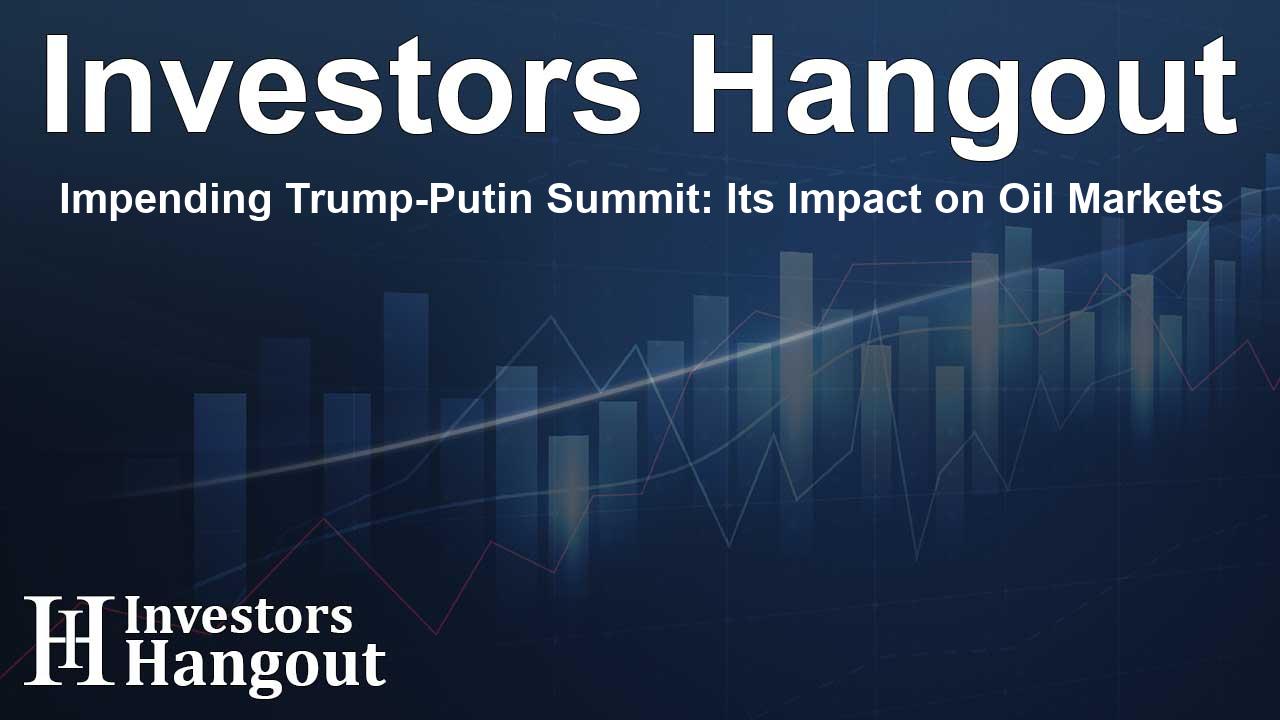Impending Trump-Putin Summit: Its Impact on Oil Markets

Impending Meeting of World Leaders and Its Oil Impact
As President Donald Trump prepares to meet with Russian President Vladimir Putin, many are watching closely to see how this pivotal meeting could influence global oil markets. The stakes are high, with speculations around peace, economic ramifications, and potential retaliations swirling in the air. Oil traders and experts are on edge, considering the profound implications for energy markets.
Historical Context of the Summit
This upcoming summit marks a significant point in U.S.-Russia relations, being the first direct discussions between the two leaders since the onset of geopolitical tensions following the invasion of Ukraine. This pivotal moment occurs 42 months into the ongoing conflict, emphasizing the urgency of the negotiations and their potential ramifications.
Trump's Position on Ceasefire Agreements
President Trump has made it clear that achieving a ceasefire is one of his top priorities for the meeting. He has indicated that if an agreement cannot be reached, there would be formidable consequences from the U.S. side. During recent statements, Trump commented on possible compromises, stating, "There will be some swapping of territories, to the betterment of both," despite the Ukrainian leadership's adverse reactions to such ideas.
Consequences Expected Should Ceasefire Fail
Trump has candidly warned that if military hostilities continue unabated, the U.S. will pursue stringent sanctions and punitive measures aimed at Russia and its allies. These remarks highlight the potential for a rapid escalation of economic pressure tied to energy dynamics.
Bessent Speaks on U.S. Strategies
U.S. Treasury Secretary Scott Bessent recently asserted that the administration is ready to increase pressure, especially against nations continuing to support Russian oil exports. He noted that secondary tariffs on allies might escalate if negotiations fail, signaling the administration's zero-tolerance policy towards circumventing sanctions.
Examination of European Participation
Bessent also expressed frustrations about European countries' hesitance to adopt more aggressive stances regarding sanctions, revealing a sense of urgency within the U.S. administration to unify its stance against perceived threats from Russian oil exports.
Market Reactions Ahead of the Summit
As anticipation builds for the Trump-Putin meeting, oil markets are bracing for potential volatility. Analysts at Goldman Sachs have assessed that despite the tense atmosphere, immediate risks to Russian oil supply remain contained, irrespective of the outcomes from the discussions.
In recent weeks, Brent oil prices have experienced declines, falling approximately 10% since late July as traders anticipated delays in sanctions implementation. Currently, West Texas Intermediate crude is priced at $62 per barrel, showcasing the market's reaction to geopolitical developments.
Scenarios for Oil Supply and Demand
Goldman Sachs has outlined three possible scenarios in conjunction with the summit:
- Potential Peace Deal: Should a consensus be reached, U.S. sanctions may be relaxed, although major Russian supply increases are not anticipated due to existing quotas and low investment in upstream production.
- Escalation Risks: A breakdown in talks could lead to the introduction of new tariffs or sanctions. Nevertheless, existing trends indicate that Russia may leverage price discounts to maintain market share, particularly with continued support from nations like China and India.
- Status Quo: In the absence of decisive action or agreements, oil markets may continue along their current paths, absorbing the uncertainties without immediate shocks.
Looking Forward to the Meeting's Aftermath
With all eyes set on Alaska for this consequential meeting, financial markets anticipate potential fluctuations in response to emerging headlines. Yet, analysts remain cautious, indicating that the summit may not significantly alter Russian oil flow patterns in the immediate future.
The combination of geopolitical pressures, economic sanctions, and energy needs will dictate the outcomes of the summit and its reverberations across global oil markets. Investors should stay tuned as developments unfold.
Frequently Asked Questions
What is the significance of the Trump-Putin meeting?
The meeting represents a critical juncture for U.S.-Russia relations, potentially impacting sanctions and oil markets significantly.
How could the talks affect oil prices?
The outcome may lead to either easing or imposing sanctions, which would directly impact oil supply and pricing strategies worldwide.
What are the potential scenarios outlined by analysts?
Three scenarios include a peace deal, escalation of tensions, or maintaining the current status quo regarding oil supply and demand.
What role does Scott Bessent play in the negotiations?
Bessent, as Treasury Secretary, emphasizes the U.S. administration's strategy to increase pressure on nations facilitating Russian oil exports.
How have oil prices reacted recently?
Brent oil prices have fallen by 10% since late July, and current trading indicates a delicate balance influenced by ongoing geopolitical tensions.
About The Author
Contact Henry Turner privately here. Or send an email with ATTN: Henry Turner as the subject to contact@investorshangout.com.
About Investors Hangout
Investors Hangout is a leading online stock forum for financial discussion and learning, offering a wide range of free tools and resources. It draws in traders of all levels, who exchange market knowledge, investigate trading tactics, and keep an eye on industry developments in real time. Featuring financial articles, stock message boards, quotes, charts, company profiles, and live news updates. Through cooperative learning and a wealth of informational resources, it helps users from novices creating their first portfolios to experts honing their techniques. Join Investors Hangout today: https://investorshangout.com/
The content of this article is based on factual, publicly available information and does not represent legal, financial, or investment advice. Investors Hangout does not offer financial advice, and the author is not a licensed financial advisor. Consult a qualified advisor before making any financial or investment decisions based on this article. This article should not be considered advice to purchase, sell, or hold any securities or other investments. If any of the material provided here is inaccurate, please contact us for corrections.
